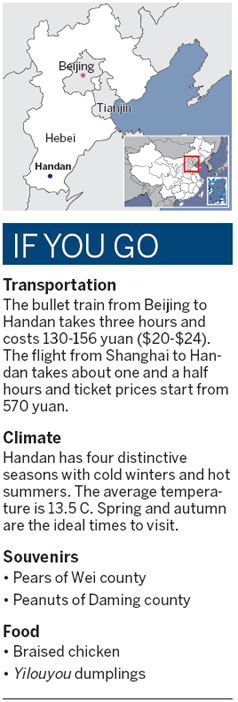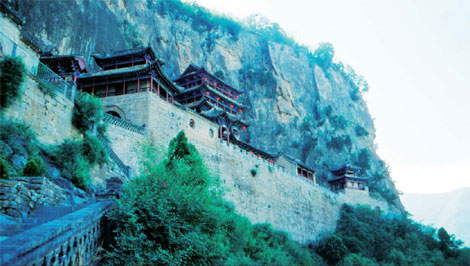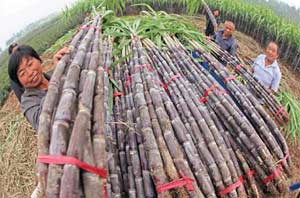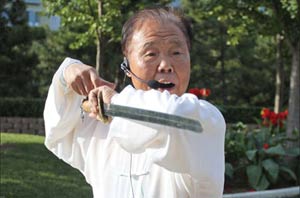City of the idiom
Updated: 2011-10-14 08:58
By Liu Xiaozhuo (China Daily)
|
|||||||||
|
Wahuang Palace, sitting on Fenghuang Hill, is built to show respect to goddess Nu Wa. [Chen Zhanwu / For China Daily] |
Words of wisdom have flowed through the streets of Handan for thousands of years
'One day a thousand autumns" means rapid changes. "One day a thousand miles" means fast progress and "one day, three autumns" means missing someone greatly because one day seems like three years. There are more than 3,000 famous Chinese chengyu (four-word idioms) that are still widely used in modern conversations, but where did all these sayings originate?
Thousands of years ago, Handan, in today's Hebei province, was once a grand city that attracted the nation's best minds and writers. It was the capital of the state of Zhao during the Warring States Period (475-221 BC) and grew to become one of the five most prosperous cities during the Han Dynasty (206 BC-AD 220).
Because of its history and long list of interesting locals, scholars attribute the source of more than 1,500 chengyu to Handan. One famous idiom features the city itself. Handan Xue Bu (learn to walk in Handan) warns people not to lose their individuality in pursuit of copying the style of others.
The idiom comes from a story by Zhuang Zi, who wrote about a man who was dissatisfied with everything in his life, even with the way he walked. He heard that the Handan people had a graceful walking style but not only did he fail in copying Handan people he forgot his own way of walking.
Today's Handan people are still proud of their walking style and also of the many historical landmarks that make their city famous. Here are five places to see.
1. Wu Ling Cong Tai
This three-story terrace is the symbol of Handan and was built by King Wu Ling of Zhao 2,300 years ago to watch dancing performances and military parades. From the terrace a visitor can see magnificent scenic spots. Overhead bridges, pavilions and rockeries all complement these exquisite grounds.
Cong Tai has had its ups and downs and has been reconstructed many times. In the Ming Dynasty (1368-1644) it was constructed more than 10 times and in 1830 it was destroyed in an earthquake. The Cong Tai you see today was rebuilt in the Qing Dynasty (1644-1911).
2. Huangliangmeng town

Located 11 kilometers from the city center, this small town is literally built on a story of a dream about a poor young scholar on his way to the capital to take exams to become a government official.
While sleeping at a local inn he had a dream that he had achieved good results, was promoted, won his fortune, married a beautiful woman and had lots of children. Then he woke up and realized that it was nothing but a dream.
A pipe dream is often used to describe a situation when hopes are dashed.
The Huangliangmeng Luxian Temple, built during the Ming Dynasty, is based on this story and its surroundings try to recreate this dreamy mood.
3. Wahuang Palace
Located in Fenghuang Hill in Shexian, it was built 1,400 years ago to celebrate a special goddess. According to myth, Nu Wa used the soil in the Yellow River to make clay figures of millions of humans, which came alive when she blew on them. Nu Wa is also a protector and can relieve human suffering.
The ancients commemorated Nu Wa's love and kindness and showed their respect by constructing the palace on the spot where she refined the stones.
The complex sits on a hillside and blends perfectly with its surroundings. In the palace there are also inscriptions from classic Buddhist scriptures and good examples of Chinese calligraphy.
4. Daming county
Daming town features in the classic novel Outlaws of the Marsh, which was translated by Pearl Buck into English.
Daming is also famous for its traditional dishes. The braised chicken, named Zhenjicheng, originated in the Qing Dynasty and is stewed in a soup made of rare herbs. People living in Daming town are proud of the soup because its recipe has not changed for more than 100 years.
There are also many other kinds of delicious foods that are worth tasting, such as a local sausage and baked wheaten cake.
People in Daming town love to eat and cook so visitors should not miss out on the local cuisines.
5. Jingniang Lake
About 60 km east of the city in an area of more than 167 hectares, the 50-meter-deep lake is surrounded by mountains and trees.
It a silent place to escape the noise and crowds of big cities. A boat trip on the lake is the way to go and will help you enjoy the fresh air.










